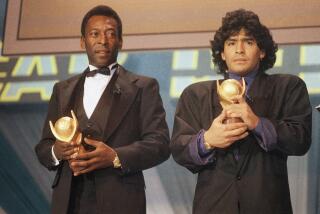Maradona Is the Star of Shirt and Tie, 1-1
- Share via
PUEBLA, Mexico — At the end, after it was over and the teams were walking off the Cuauhtemoc Stadium field, Salvatore Bagni approached Diego Maradona and asked to swap jerseys.
The burly Italian defender had spent an hour and a half shadowing his more famous Argentine opponent, and now, the final whistle having sounded, he wanted something tangible by which to remember the day.
“This is Diego’s jersey, the one he wore in the World Cup in 1986,” is along the lines of what Bagni planned to say to friends and family back in Naples in years to come. “It was the day we played in Puebla. You remember. It was a tie, 1-1.”
But, sad to say, Bagni did not get the jersey from Maradona, at least not on the field. Dutch referee Jan Keizer, perhaps in the interests of decorum, prevented the swap. If Bagni got the souvenir, it was a trade made in the privacy of the locker room.
That Maradona was willing to agree to the exchange, however, is a sign of the respect he has for Bagni’s defensive effort. It also might have had something to do with the fact that both play for the same club team in Italy--Napoli.
It was a shrewd move on Italian Coach Enzo Bearzot’s part, assigning the top defender on the Naples club to guard the top forward. What other player would know Maradona as well as Bagni?
And it worked, at least as well as could be expected. There are few players in the world who can keep Maradona contained, and Bagni managed to do so for all but one brief moment.
That split-second, however, was all Maradona needed to score his first goal of the World Cup. A quick turn, a sudden burst of acceleration, and Bagni had been left behind, Maradona circling around him to accept a pass from teammate Jorge Valdano.
Before Bagni could recover, Maradona had glanced up, gauged the angle and fired a shot past the startled Italian goalkeeper, Giovanni Galli.
That goal, in the 34th minute, was enough to offset a much earlier and certainly more controversial goal scored by Italy’s Alessandro Altobelli on a penalty kick.
Just what the infraction had been that led to the penalty kick was not immediately clear to the fans or the media, but it later was learned that Argentina’s Jorge Burruchaga had handled the ball during a scramble inside the penalty area.
Asked afterward about the call in the seventh minute, Argentine Coach Carlos Bilardo said: “I never speak about the referee. You (reporters) are here to write about it. You have your TV cameras. You saw it.”
Unhappy as he might have been about the penalty that put Argentina into an early hole, Bilardo was nonetheless pleased that his team was able to climb out of it.
He praised his players’ performance, pointing out that they’d had only a two-day rest after a 3-1 win over South Korea, whereas Italy had four days to recuperate from Saturday’s 1-1 tie with Bulgaria.
Bilardo also had kind words for the Italians’ treatment of Maradona, saying the defensive job done by Bagni and several others had been exemplary. “It was very honest, very fair,” he said. “not at all like it was against South Korea.”
Monday, the South Koreans had constantly fouled Maradona with brutal tackles, but the Argentine captain showed no ill effects Thursday.
Meanwhile Italy, as it had done against Bulgaria, once again failed to capitalize on its scoring chances, which must be troubling Bearzot.
Asked for the umpteenth time whether Paolo Rossi, Italy’s hero of 1978, would play in this tournament, Bearzot calmly replied that he was perfectly pleased with the job being done by Giuseppe Galderisi. The inference was clear: Don’t expect to see Rossi in the Italian lineup soon.
Apart from the Italians’ inability to put the ball in the back of the net--a trait they share with more than a few World Cup teams--the other disappointing aspect to the defending world champions’ play was their willingness late in the game to settle for the tie.
But, as Bearzot said, it did give them a point and keep intact their hope of advancing to the next round. If, that is, they can beat South Korea next Tuesday.
“Today, we were better in the first half than in the second half,” Bearzot said. “Athletically, the Argentines were superior to us. Maradona played excellently.”
But then, so did Bagni, and the result was a fair reflection of the meeting between the defending world champion and 1978 champion.
Each team had other scoring chances, but each was unable to finish as well as it had started. The closest either team came was in the 57th minute when Italy’s Bruno Conti slammed a shot against the base of the right post, with Argentine goalkeeper Nery Pumpido well beaten.
In the 70th minute, a fierce shot by Antonio Cabrini brought a diving save from Pumpido.
At the other end, two headers in the closing minutes, the first by Oscar Ruggeri and the second by Valdano, came close, but both ended up wide of the mark.
Referee Keizer had experienced some difficulty in keeping tempers under control in a hotly debated first half. But his issuing of yellow warning cards to Italy’s Giuseppe Bergomi and Argentina’s Ricardo Giusti and Oscar Garre held the players in check in the second half.
Bergomi’s yellow card was his second of the tournament, meaning that he will miss Italy’s game against South Korea.
More to Read
Go beyond the scoreboard
Get the latest on L.A.'s teams in the daily Sports Report newsletter.
You may occasionally receive promotional content from the Los Angeles Times.







